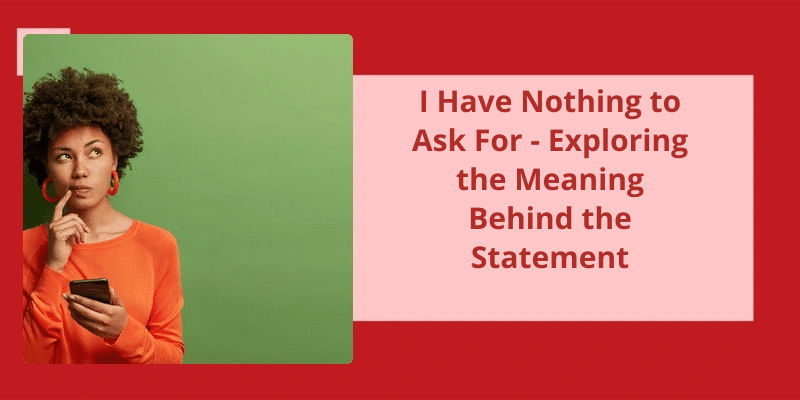What Is the Meaning of Have Nothing to Do?
With the scandal that was being reported on the news. It was clear that he wanted to distance himself from any negative association. This idiom is often used to describe a person or situation that’s completely unrelated to another person or situation. It implies a complete lack of connection or interaction between two individuals or groups.
The phrase “have nothing to do” can also be used to describe a state of being bored or unoccupied. When one says they’ve nothing to do, they’re expressing a sense of emptiness or a lack of purpose in their current situation. It conveys the idea that there’s a need for stimulation or engagement in order to avoid feelings of restlessness or ennui.
Furthermore, “having nothing to do” can describe a situation where an individual feels a lack of control over their schedule or activities. When one has no control over their time or activities, they may feel frustrated or anxious. This can lead to a sense of aimlessness or a feeling of being lost. In order to regain a sense of control, one may need to actively seek out activities or projects that align with their interests and goals.
It can describe a lack of connection or involvement, a state of boredom or purposelessness, a feeling of helplessness, a lack of personal growth or development, or a combination of these factors. In order to overcome this feeling, it may be necessary to actively seek out new experiences, challenges, and opportunities for connection and engagement. By doing so, one can create a more fulfilling and meaningful life.
The phrase “want nothing more” conveys a sense of contentment and satisfaction with achieving one’s desired outcome. It suggests that the person in question has no further aspirations beyond the present moment or situation. However, the phrase can also imply a degree of simplicity or modesty in one’s desires, suggesting that what they want isn’t grand or excessive, but rather attainable and reasonable.
What Does Want Nothing More Mean?
The phrase “want nothing more” is a powerful expression of contentment and satisfaction. It’s about striking a balance between achievable goals and the ability to be content with what one has. To want nothing more is to be fulfilled and happy, to be at peace with oneself and the world. It’s a state of mind that’s achieved by those who appreciate the joys of life, rather than constantly striving for something more.
They don’t desire anything else, and are satisfied with their current situation. This could refer to material possessions, relationships, or personal achievements. For example, someone who’s achieved success in their career may want nothing more than to spend time with their friends and family.
Ultimately, wanting nothing more is a personal choice that requires a great deal of self-reflection and introspection. Whether we’re pursuing our dreams or simply enjoying the company of loved ones, we can all learn to want nothing more than what we already have.
The Relationship Between Wanting Nothing More and Happiness.
There’s a possible correlation between wanting nothing more and happiness. When a person feels content with what they’ve and aren’t constantly seeking more, they may experience greater satisfaction and joy. However, additional factors such as personal values and life circumstances can also impact one’s level of happiness.
Source: want nothing more (than) Definitions and Synonyms
What Does I Didn’t Ask for This Mean?
The phrase “I didnt ask for this” is often used when someone is presented with something they didn’t expect or want. This can occur in a variety of situations, such as when a person receives a gift they don’t like or when they’re forced to participate in an activity they aren’t interested in. It’s a way of expressing frustration or annoyance at having something imposed upon them.
For example, if someone is put in charge of a project at work without asking for it, they might use this phrase to express their frustration at being given a task they didn’t ask for.
At other times, the phrase can be used to express a lack of control over a situation. If someone is dealing with a difficult or unpleasant circumstance, they might use this phrase to express their frustration at not being able to change it.
It can be used in a lighthearted or serious manner, depending on the situation and the tone of the speaker.
It acknowledges that something unwanted or unexpected has been imposed upon the speaker, and that they aren’t happy about it. It’s a way of asserting ones autonomy and reminding others that they should be respectful of ones boundaries and desires.






